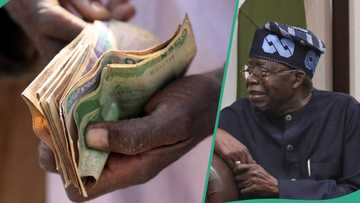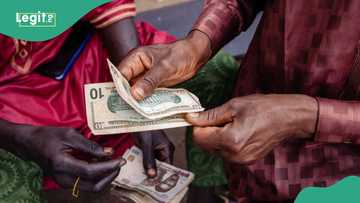Rewane Predicts New Naira Against US Dollar Exchange Rate in June, July
- Economist Bismark Rewane has projected a favourable exchange rate performance for the naira against the US dollar
- The financial expert also forecasted a slight drop in inflation to 23.15% and a 50 basis point cut in the Monetary Policy Rate
- The Nigerian currency has enjoyed a strong performance in recent days, both at the official and unofficial forex markets
Legit.ng journalist Dave Ibemere has over a decade of experience in business journalism, with in-depth knowledge of the Nigerian economy, stocks, and general market trends.
Bismarck Rewane, the Chief Executive Officer (CEO) of Financial Derivatives Company, has projected that the naira will trade between N1,600 and N1,650 in the official foreign exchange market in June and July.
He cited data that indicated effective measures by the Central Bank of Nigeria to manage money supply growth, which peaked at 78% in May last year, as the basis for his projection about the Nigerian currency.
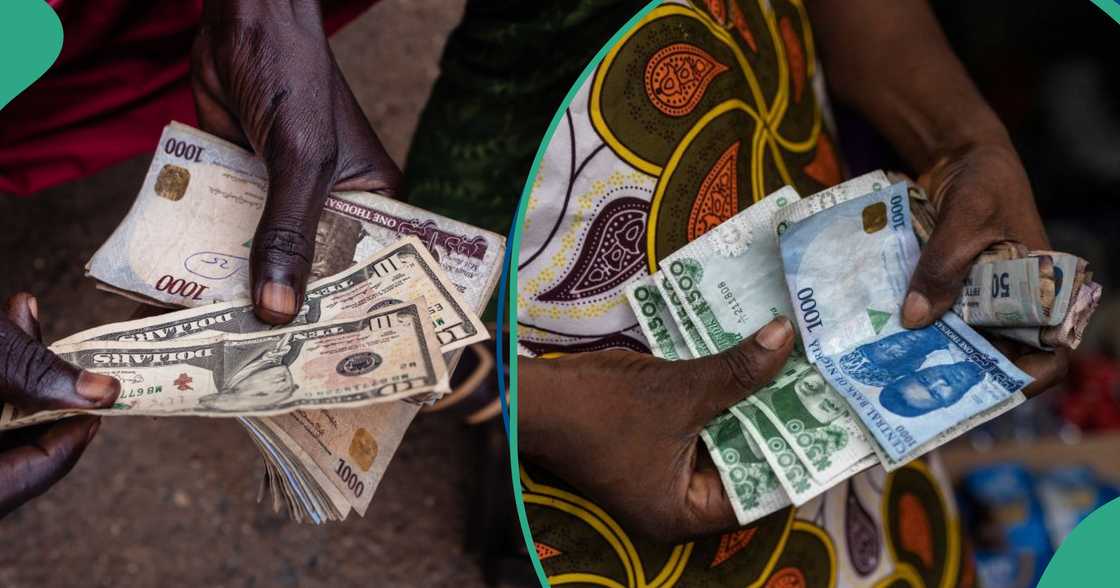
Source: Getty Images
He gave this projection while speaking at the recent Lagos Business School breakfast club meeting.
He said:
"The official and parallel market exchange rates have converged, with the spread now within a N50 margin, indicating that the Naira is now fairly priced.
"We expect that the weakening of the US dollar down 8.7% year-to-date could support the local currency, which is expected to remain stable throughout 2025."
Expert predicts new naira-dollar exchange rate
Rewane also expected a cut of a hefty 50 basic points in the policy rate by the Monetary Policy Committee (MPC), when it held its next meeting.
The financial expert also said the Federation Account Allocation Committee (FAAC) was likely to maintain a robust N1.6 trillion, buoyed by reduced corporate income tax liabilities.
Additionally, Rewane anticipated further reductions in the prices of Premium Motor Spirit (PMS) to N845 per litre and diesel to N950 per litre.
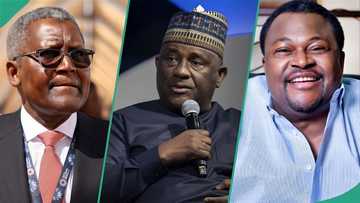
Read also
More Billionaires join Dangote, Elumelu as Nigerian Investors gain N13.1 trillion in just six months
He maintained that despite a surge in net foreign reserves and significant moderation in money supply growth, the naira remains undervalued by approximately 26.82%.
Compared to the NAFEM rate of N1,599.33 to the dollar, this suggests an undervaluation of 27.08%.
Highlighting broader economic trends, Rewane pointed out that the Purchasing Power Parity (PPP) rate for the naira should ideally stand at N1,158.50, particularly as the US dollar has weakened by 8.7% against global currencies year-to-date.
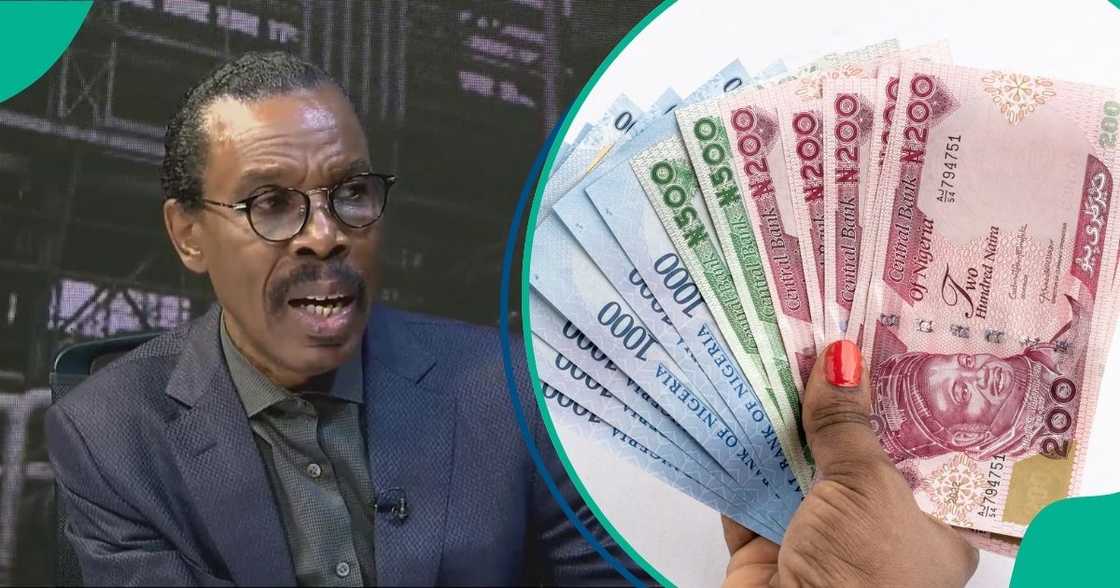
Source: Getty Images
Naira-dollar could result in more opportunities
In his presentation to the CEOs attending the meeting, Rewane pointed them to key sectors where they could look to find value in the near term.
The sectors include power, which currently has over 50% unmet demand, and agriculture, where there is a rising need for storage, mechanisation, and processing capacity in a country facing severe food insecurity.
Rewane also spoke about the opportunities in the healthcare and pharmaceutical sectors with rising demand, weak public infrastructure and growing private sector need that is unmet.
However, he cautioned that energy sector investments in Nigeria remain constrained by policy uncertainties, forex risks, and tariff discrepancies, deterring potential investors.
Expert sees CBN reforms, inflows as key drivers
A foreign exchange market expert, John Oyem, in a chat with Legit.ng, supported economist Bismarck Rewane’s projection on the naira-dollar outlook, noting the figures are in line with fundamental economic indicators and market forces.
“Economist Bismark Rewane hit the nail on the head when he talked about the Purchasing Power Parity (PPP). Ideally, the Naira should be around N1,158.50, especially considering the US dollar has actually weakened by about 8.7% against other global currencies this year. That puts things into perspective," he said.
He noted that the outlook remains cautiously optimistic, with Rewane projecting a fairly stable range in the months ahead.
“So, what's the outlook? Rewane is penciling in the Naira to trade between N1,600 and N1,650 in the official market for June and July. And get this, he's even more optimistic, suggesting the Naira could remain stable throughout 2025.”
Oyem added that while some depreciation is still expected over time, wild market fluctuations are less likely:
“While a gradual depreciation is still anticipated, likely settling around N1,629.58/$ by end of Q2 2025 and potentially N1,714.18/$ in 12 months, major volatile swings are less expected.”
According to him, key factors that will shape the currency’s path include:
“Improving foreign exchange inflows, the CBN's tight monetary policy (aimed at curbing inflation), and the positive impact of reforms like the expected completion of the Dangote Refinery reducing import demand.”
Naira's FX rate impact on inflation
The naira’s foreign exchange (FX) rate has a direct and significant impact on inflation in Nigeria, due to the country's heavy dependence on imports for both consumer goods and production inputs. Here’s how the linkage works:
1. Imported Inflation
Over 60% of Nigeria’s consumer goods and raw materials are imported, including food, fuel, pharmaceuticals, and machinery.
When the naira depreciates against major currencies like the US dollar, the cost of these imports rises, leading to higher retail prices and overall consumer price inflation.
2. Fuel and Energy Prices
Although Nigeria produces crude oil, it imports refined petroleum products.
A weaker naira makes these imports more expensive, contributing to higher petrol and diesel prices, which fuel transport and production costs, thus spreading inflation across the economy.
3. Pass-Through Effect
The exchange rate pass-through (ERPT) in Nigeria is high. This means changes in the FX rate are quickly reflected in domestic prices.
For example, a sharp naira depreciation can instantly raise prices in open markets, especially for food and electronics.
4. Expectations and Speculation
Persistent naira volatility can erode public confidence, prompting hoarding, dollarisation of savings, and speculative price hikes by traders, amplifying inflationary pressure.
5. CBN Monetary Policy Response
To counter FX-induced inflation, the Central Bank of Nigeria (CBN) often raises interest rates (Monetary Policy Rate – MPR).
However, this tight monetary stance can stifle credit and economic growth while not always curbing supply-driven inflation caused by FX shocks.
A weaker naira drives inflation in Nigeria primarily by making imports more expensive, inflating transport and production costs, and triggering speculative pricing.
Stabilising the FX rate through increased reserves, boosting exports, and improving investor confidence is essential to managing inflation sustainably.
Naira exchange rate starts June strong
Earlier, Legit.ng reported that the value of the currency appreciated against the dollar in the official foreign exchange market.
There was also an improvement in the naira’s performance in the parallel or black market.
The stronger performance of the naira, which was at N1,551/$ at the time of this report, had enabled the CBN to reduce the exchange rate used by the Nigeria Customs Service for import duties.
The article was updated with additional information by the head of the business desk, Victor Enengedi.
Editorial assistant Ololade Olatimehin provided exclusive commentary from a Forex market expert for this report.
Proofreading by Bruce Douglas, copy editor at Legit.ng.
Source: Legit.ng


